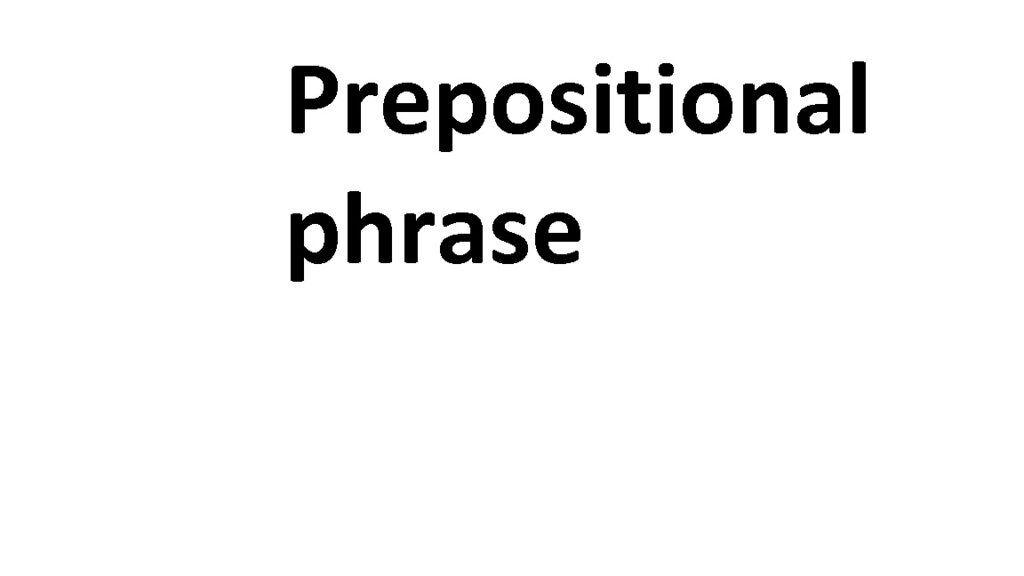Prepositional phrase
A prepositional phrase is a group of words that begins with a preposition and functions as an adjective, adverb, or noun in a sentence. It provides additional information about the relationship between the object of the preposition and other elements within the sentence. The prepositional phrase typically consists of a preposition, its object, and any modifiers that may appear between them.
Here is a breakdown of the components of a prepositional phrase:
Preposition: A preposition is a word that shows the relationship between a noun (or pronoun) and another word in the sentence. Common prepositions include “in,” “on,” “at,” “by,” “with,” “for,” “to,” and “from,” among others.
Object of the Preposition: The object of the preposition is the noun or pronoun that follows the preposition and is directly affected by it. It can be a person, place, thing, idea, or time.
Modifiers: Modifiers are optional words that may appear between the preposition and its object. They provide additional information about the object or specify its location, time, or manner.
Here are some examples of prepositional phrases:
Adjective Phrase:
The book on the shelf is mine. (The prepositional phrase “on the shelf” describes the noun “book” and answers the question “Which book?”)
Adverb Phrase:
We went to the park yesterday. (The prepositional phrase “to the park” modifies the verb “went” and answers the question “Where did we go?”)
Noun Phrase:
The cat with green eyes is adorable. (The prepositional phrase “with green eyes” describes the noun “cat” and answers the question “Which cat?”)
Adjective Phrase:
She is fond of playing the piano. (The prepositional phrase “of playing the piano” modifies the adjective “fond” and answers the question “What is she fond of?”)
Adverb Phrase:
They ran across the field swiftly. (The prepositional phrase “across the field” modifies the verb “ran” and answers the question “Where did they run?”)
Noun Phrase:
The key to success is hard work. (The prepositional phrase “to success” functions as a noun and is the object of the noun “key.”)
Remember that prepositional phrases can appear at the beginning, middle, or end of a sentence, and they play a crucial role in providing additional details and clarifying relationships within sentences.
Prepositional Phrase function as adverb:
This type of prepositional phrase functions as an adverb, modifying a verb, adjective, or adverb in the sentence. It answers questions such as “How?”, “When?”, “Where?”, “Why?”, or “To what extent?” Example: She ran to the store (to the store modifies the verb ran, indicating the direction of her running).
Adjectival Prepositional Phrase:
An adjectival prepositional phrase functions as an adjective, modifying a noun or pronoun in the sentence. It provides additional information about the noun. Example: The book on the shelf is mine (on the shelf modifies the noun book, specifying its location).
Prepositional Phrase of Time:
This type of prepositional phrase indicates when an action or event occurs. Example: I will meet you at 6 p.m. (at 6 p.m. indicates the time of the meeting).
Prepositional Phrase of Place:
A prepositional phrase of place describes the location or position of something. Example: The cat is under the table (under the table specifies the position of the cat).
Prepositional Phrase of Purpose:
This type of prepositional phrase expresses the purpose or reason for an action. Example: She went to the gym to exercise (to the gym specifies the purpose of her going).
These are just a few examples of prepositional phrases. Prepositional phrases can be used in various ways to provide additional information and add detail to a sentence.
Most common preposition
about
above
across
after
against
along
among
around
as
at
before
behind
below
beneath
beside
between
beyond
by
down
during
except
for
from
in
inside
into
like
near
of
off
on
onto
out
outside
over
past
round
since
through
throughout
to
toward
under
underneath
until
unto
up
upon
with
within
without
Prepositional phrase in ACT, Digital SAT, EST
On the ACT, Digital SAT, EST exam, prepositional phrases are often tested in questions related to grammar, sentence structure, and sentence correction. Understanding prepositional phrases can help you identify errors and improve your performance on the ACT English section. To identify the sentence structure you can trim the prepositional phrase. Here are some examples of prepositional phrases in ACT usage:
Identifying Prepositional Phrases:
Example: “The book on the table is mine.”
Prepositional Phrase: “on the table”
Usage: Prepositional phrases like this can provide additional information about the noun “book.”
Placement of Prepositional Phrases:
Example: “She went to the store quickly.”
Prepositional Phrase: “to the store”
Usage: Prepositional phrases can be placed at different points in a sentence to convey specific meanings.
Prepositional Phrases and Modifiers:
Example: “The boy with the red hat is my brother.”
Prepositional Phrase: “with the red hat”
Usage: Prepositional phrases can act as modifiers to provide more details about a noun.
Prepositional Phrases in Complex Sentences:
Example: “After the rain stopped, the sun came out.”
Prepositional Phrase: “After the rain stopped”
Usage: Prepositional phrases can indicate time relationships within a sentence.
Identifying Errors with Prepositional Phrases:
Example: “She is good in playing the piano.”
Error: Incorrect use of the preposition “in.”
Correction: “She is good at playing the piano.”
On the ACT, Digital SAT, EST being able to recognize prepositional phrases and understand how they function in sentences can help you identify errors, improve sentence structure, and select the correct answers in grammar-related questions.
you can find us n Facebook
Practice Digital SAT

